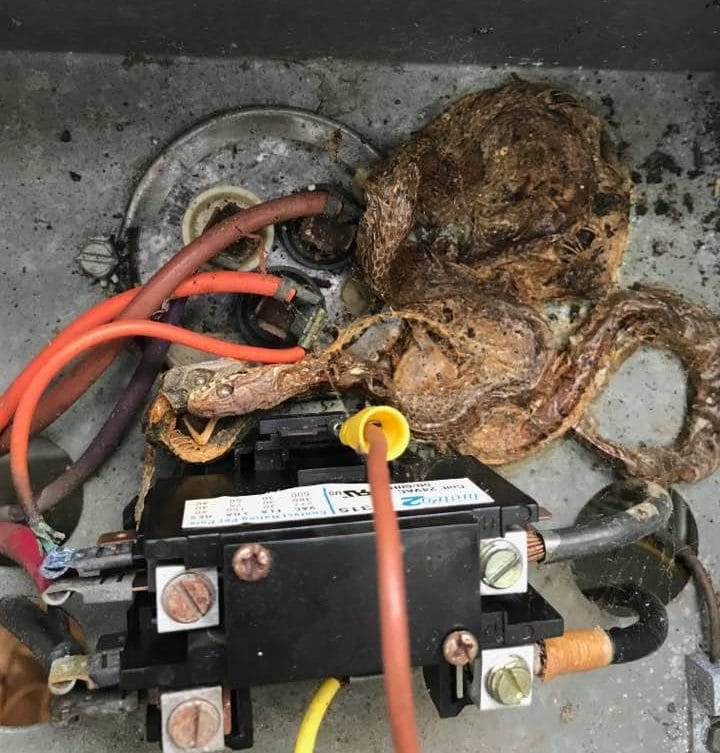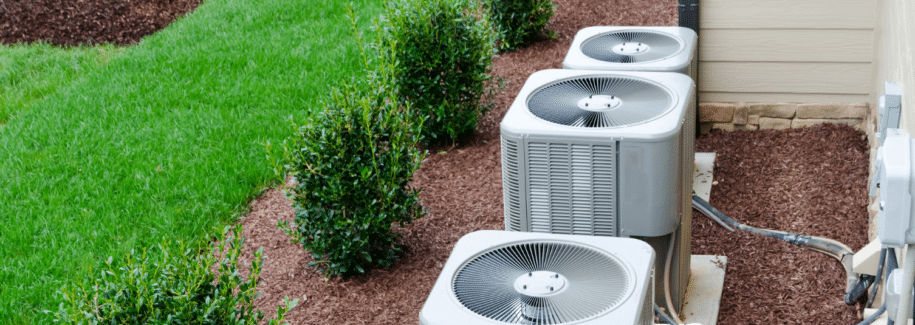There are a host of outdoor elements that your condenser is exposed to daily. Animals, debris, extreme heat, and flooding can all cause damage to your outdoor unit, but there are ways to protect your investment from damage. At Gator Air & Energy, we want to help you keep your air conditioner running as long as possible, so we have some advice on how to prevent damage to your outdoor condenser.
At Gator Air & Energy, we want to help you keep your air conditioner running as long as possible.
Protecting Your Condenser From Animals

The animals in Gainesville are adorable but they can also wreak havoc on your outdoor condenser. The tiny lizards (known as anoles), snakes, raccoons, squirrels, birds, and even pets can cause physical damage to your unit.
Particularly, animals can cause damage to your condenser fan motor and capacitor. Snakes, for example, like to curl up inside the condenser when it is off. But when it turns back on, it’s bad news for the snake and bad news for your air conditioner!
Use a Pest Repellent
One way to prevent animals from harming your outdoor condenser is to spray pest repellent around the unit. Commercial pest repellents are found at most hardware or outdoor stores as well as online. They use a scent that most pests will find unattractive. Spray the pest repellant evenly around the unit, and it should help keep the pests away.
Clean the Area Around the Condenser Regularly
If animals urinate around the unit, it can attract other animals to the area. Spray down the area around your condenser unit with water regularly to ensure that no other animals come around.
Protecting Your Outdoor Condenser From Leaves & Debris
Leaves, pollen, branches, and other debris can get caught in your outdoor condenser. This debris not only harms the unit’s fan, but if enough debris is sucked through the system, it can drastically reduce your air conditioner’s efficiency. As part of AC maintenance service, we clean your unit and ensure that your unit is free of debris.
Use a Condenser Cover
Once you have cleaned the outdoor condenser, you can use a condenser cover to protect the unit. These covers are made of a thin sheet of fabric that allows the unit to take air in but also prevents debris from getting in the unit.
Use a Year-Round Exterior Filter
Another option is to use a year-round exterior condenser filter. This option is typically made of a thin mesh of metal and protects the unit from larger debris. You can find these filters at any major home improvement store as well as online.
Protecting Your AC Condenser From Extreme Heat
Extreme heat can take a toll on your air conditioner on all fronts, but the outdoor condenser unit is especially vulnerable. There are a few things you can try to keep your unit from overheating, but it’s important to note that these methods are only necessary if the temperatures rise above 120℉. Air conditioners can withstand high temperatures in normal operation, even for the high temperatures in Gainesville.
Use a Mister
In extreme heat, you can use a water mister to cool the unit down from the outside. However, this is only a strategy for extreme heat and shouldn’t be used on a regular basis. Prolonged exposure to misty water can rust the unit’s components.
Check Your Ducts
If air is escaping anywhere in your air conditioning system, then it will affect how efficiently your condenser runs. Our duct sealing service ensures that your system is working as intended, which will help your outdoor condenser function, even in extreme heat.
Protecting Your AC Condenser From Flooding
A typical rainfall, even the downpours we experience here in Gainesville, won’t damage your outdoor condenser. Condensers are built to withstand even the heaviest downpours, and the components in the unit are well-protected with plastic and are water-repellent.
However, flooding is a different story. If your unit gets submerged in water, it can cause damage to the unit and also pose a serious safety concern.
Immediately Turn Off Electrical Power
If you notice that your outdoor condenser is flooded, immediately turn off any electrical power going to the unit. The circuit breaker in your home should have a switch labeled for the condenser. Leave your condenser off until you have a qualified HVAC professional inspect the unit.
Get Rid of Standing Water
If you can, get rid of any standing water around your unit. You can use a shovel to create a makeshift drain to carry water safely away from your unit. Also, remove any debris that you see that may have settled around your outside condenser due to the flooding.
Contact Gator Air & Energy for AC Condenser Sevices
If you have experienced any of the problems listed above, we can help you repair your outdoor condenser and get it back to running efficiently as quickly as possible. Also, we recommend regular AC maintenance service is performed on your unit every 6 months. During our service, we inspect, clean, and tune up the outdoor condenser to make sure it works properly.
Call us today and let our experts help you keep your condenser running at its best!





